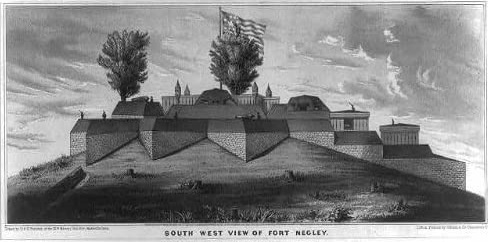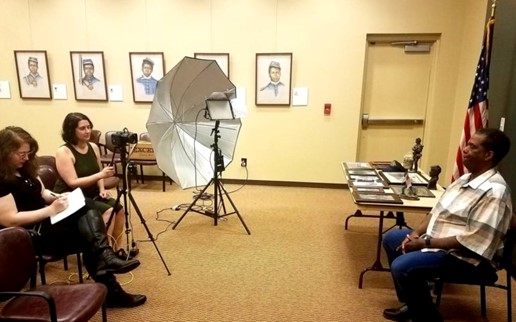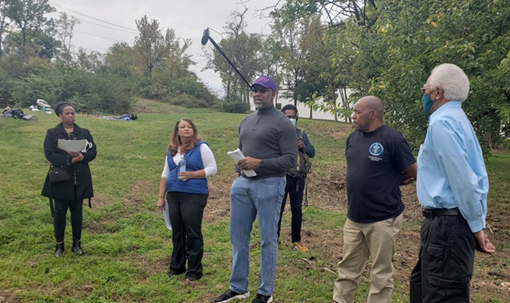Builders and Defenders
About the Project
What:
The Builders and Defenders database is a collaborative project which collects the names and biographical information of a Black Civil War era population in Nashville, Tennessee, connected to the UNESCO site of memory, Fort Negley. The data focuses on the builders: nearly 5,000 enslaved and free Black people who built the fortification and related infrastructure in difficult circumstances in 1862, and the defenders: over 13,000 members of the United States Colored Troops who defended it during the 1864 Battle of Nashville. The remaining entries in the database are about the people who were related to or mentioned alongside this population in the primary source documents and therefore played a role in shaping Black Nashville’s Civil War era population.

Where:
The UNESCO Site of Memory, Fort Negley Park, is located Southeast of downtown Nashville, Tennessee. The builders and defenders of Fort Negley came from all across the Eastern half of the nation, from Boston down to Florida, and as far West as Collin County, Texas! Many were self-emancipated formerly enslaved refugees. Others were free Black people from the North who enlisted with the United States Colored Troops and headed down South to help free their kin. Click here to explore our interactive mapping feature and get an idea of how geographically diverse this population was.
Who:
The amount of people who have helped to shape both the Fort Negley Descendants Project and the Builders and Defenders Database is too large to list here. Please visit the Team Page to learn more about who we are and the invaluable partners and collaborators who made this research possible.
When:
The Builders and Defenders database was conceived together by historians and descendants from the Fort Negley Descendants Project (FNDP). The FNDP is an oral history digital archive created in 2017 aimed at preserving the voices and stories of the descendants of the African-American laborers and soldiers who built and defended Fort Negley. Black families worked hard to preserve their own histories through oral and community traditions. Through the act of preserving and passing down historical narratives about their connections to Fort Negley over generations, members of the descendant community created a deeply interconnected circulation of knowledge about their ancestors. The team of historians and descendants worked together with Taneya Koonce at the Nashville Chapter of the Afro-American Historical and Genealogical Society (AAHGS) to connect descendants and to film a two-part video that shows other potential descendants how to start their own genealogical research to discover if they are a descendant of Fort Negley themselves. They held many discussions about the challenges facing African Americans doing genealogical research in this time period (roughly 1860s-1900).

Why:
The Builders & Defenders database was conceived to help mitigate some of those challenges faced by Black genealogists. This project embodies the collective decisions and conversations between descendants, public and academic historians, and software developers working together to provide open-access historical information that was locked away behind paywalls, located in disparate places, or difficult to access on microfilm. Dr. Angela Sutton, the director, and her team consisting of students and collaborators in the Nashville history and genealogy communities developed an approach to collect data from various archives and communities, and work with the developer Dr. Jim Schindling to create a database that both scholars and genealogists could use. The plan had two parts: one, that we would accept data from the community and find ways to clean and link it through the historical database software Spatial Historian, and two, that we would allow the community to determine what sources were most necessary for this database, and what information they needed to be accessible online from those sources.
How:
The grants supporting the creation of this database came from the National Endowment for the Humanities’ Office of Digital Humanities and the National Park Service’s American Battlefield Protection Program. That means that our data will be free to access in perpetuity. We have also shared the bulk of our data with Enslaved.org, a collection of linked datasets in the Harvard Dataverse concerning people of the historical slave trade. Anyone may freely use, share, and link this data as long as they cite the database.
A Note on Viewpoints:
This project is created with the presumption that descendant voices deserve to be centered in discussions of interpretation of the site of Fort Negley and its history. The database therefore was created with the understanding that digital projects have ethical responsibilities to center this community as subject-matter experts and generators of knowledge, rendering the process a co-creation. The database team believes that the history of slavery and of freedom is our shared history. Everyone in the United States lives with this legacy, though the burdens of this legacy are not shared equally. Black people experienced the Civil War in many ways, and we honor those differences. We honor the people who were forced to build and defend the UNESCO Site of Memory Fort Negley as we honor those who participated willingly in the search of freedom for themselves and their descendants. We honor those who paid the ultimate price in the fort’s construction and defense. ~Say their names, for now they are in one place~
